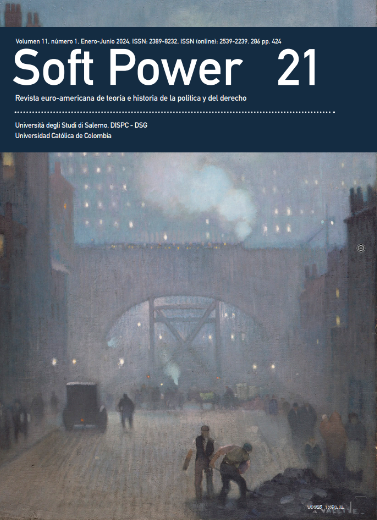
Esta obra está bajo una licencia internacional Creative Commons Atribución-NoComercial 4.0.
Al enviar los artículos para su evaluación, los autores aceptan que transfieren los derechos de publicación a Soft Power. Revista Soft Power para su publicación en cualquier medio. Con el fin de aumentar su visibilidad, los documentos se envían a bases de datos y sistemas de indización, así mismo pueden ser consultados en la página web de la Revista.Resumen
What History Returns? In a speech delivered to the Senate following the invasion of Ukraine by Russian armed forces, Italian Prime Minister Mario Draghi acknowledged that a long political era had definitively ended. The Kremlin’s decision not only brought war back to Europe but also dispelled the illusion that economic integration could ensure a peaceful future. "The jungle of history is back," Draghi said. "Its vines seek to envelop the garden of peace in which we believed we lived." The image used by the Italian Prime Minister polemically evoked the thesis enunciated by Francis Fukuyama in 1989 that the "end of history" consisted of the victory achieved by liberal democracies over every alternative political ideology. More precisely, Draghi’s words echoed a thesis that Robert Kagan had articulated almost fifteen years earlier. According to Kagan, the beginning of the new millennium dashed hopes for a freer and more peaceful world, bringing nationalist claims and the motives of old power politics back to the fore. Although the United States remained the world’s sole superpower, the ambitions of old and new players were becoming increasingly relevant. "The order of today," Kagan wrote, "reflects the rising influence of the great powers, including the great power autocracies": "a multipolar world in which the poles are Russia, China, the United States, India, and Europe would produce its own kind of order, with different rules and norms reflecting the interests of the powerful states that shaped it" (Kagan, 2008, p. 96).

Citas
Allison, G. (2018). Destined for War: can America and China escape Thucidydes Trap? Houghton Mifflin Harcourt.
Antoniol, V. (2023). Foucault et la guerre. À partir de Schmitt, contre Schmitt. Éditions Mimésis.
Aron, R. (2023). Teoria dell’azione politica. Marsilio. Arrighi, G. & Silvers B. (1999). Chaos and Governance in the Modern World System. University of Minnesota Press.
Arrighi, G. (2010). The Long Twentieth Century. Money, Power, and the Origins of Our Times. Verso.
Baccelli, L. (2022). Is War Still a Scourge? Ukraine and the international legal (dis)order. Soft Power, 9(2), 323-330.
Bacevich, A. (2023). The Reckoning That Wasn’t’. Why America Remains Trapped by False Dreams of Hegemony. Foreign Affairs, 102(2), 6-21.
Baev, P. (2022). Russia’s war in Ukraine. Misleading doctrine, misguided strategy. Russie.Nei. Report, 40, October. https://www.ifri.org/en/publications/etudes-de-lifri/ russieneireports/russias-war-ukraine-misleading-doctrine-misguided.
Brooks, S. & Wolforth, W.C. (2023). The Myth of Unipolarity: American Power’s Staying Power. Foreign Affairs, 2012(3), 79-91.
Colombo, A. (2022). Il conflitto in Ucraina e la nuova forma della guerra. Iride, 97, 481-486.
Farrell, H. & Newman, A.L. (2023). The New Economic Security State How De-Risking Wil Remake Geopolitics. Foreign Affairs, 102(6), 106-122.
Farrell, H. & Newman, A.L. (2019). Weaponized Interdependence: How Global Economic Networks Shape State Coercion. International Security, 44 (1), 42-79.
Foucault, M. (2003), “Society Must Be Defended”. Lectures at the Collège de France, 1975- 1976. Picador.
Friedman, O. (2018). Russian ‘Hybrid Warfare’. Resurgence and Politicization. Hurst & Company.
Galeotti, M. (2022). The Weaponizaton of Everything. A Field Guide to the New Way of War. Yale University Press.
Gates, R.M. (2023). The Disfunctional Superpower. Can a Divided America Deter China and Russia? Foreign Affairs, 102(6), 30-44.
Gilpin, R. (1987). The Political Economy of International Relations. Princeton University Press.
Hardt, M. & Mezzadra, S. (2024). A Global War Regime. https://newleftreview.org/sidecar/ posts/a-global-war-regime.
Hardt, M. & Negri, A. (2020). Empire. Harvard University Press.
Herz, J. (1959). International Politics in the Atomic Age. Columbia University Press.
Hokayem, E. (2023). The Gaza War and the Region. Survival, 65(6), 57–66.
Kagan, R. (2008). The Return of History and the End of Dreams. Alfred A. Knopf.
Kello, L. (2017). The Virtual Weapon and International Order. Yale University Press. Kimmage, M. & Notte, H. (20239. The age of great-power distraction. What crises in the Middle East and elsewhere reveal about the global order. Foreign affairs, 102(5).
Krieg, A. (2024). The war in Gaza, the decline of US leadership and the emergence of a networked regional order. Mediterranean Politics, 1–10.
Kupchan, C. (2013). No One’s World. The West. The Rising Rest, and the Coming Turn. Oxford University Press.
Leonard, M. (2021). The Age of Unpeace. How Connectivity Causes Conflict. Bantham Press.
Lucarelli, S. (2020). Cala il sipario sull’ordine liberale? Crisi di un sistema che ha cambiato il mondo. Vita e Pensiero.
Mearsheimer, J.J. (2014). The Tragedy of Great Power Politics. W.W. Northon & Company.
Mearsheimer, J.J. (2018). The Great Delusion: Liberal Dreams and International Relations. Yale University Press.
Nye, J.S. (2004). Soft Power: The Means to Success in World Politics. Public Affairs.
Palano, D. (2019). The "Democratic Recession" and the Crisis of Liberalism. In A. Colombo & P. Magri (Eds.), The End of a World. The Decline of the Liberal Order (pp. 37-50). Ledi.
Palano, D. (2021). La tradizione critica. Le teorie marxiste e la politica internazionale. In E. Diodato (ed.), Relazioni internazionali. (pp. 161-208). Carocci.
Parsi, V.E. (2021). The Wrecking of the Liberal World Order. Palgrave.
Sternfeld, L. (2024). The Realignment of the Middle East. Foreign Policy Research Institute. https://www.fpri.org/article/2024/03/the-realignment-of-the-middle-east/







